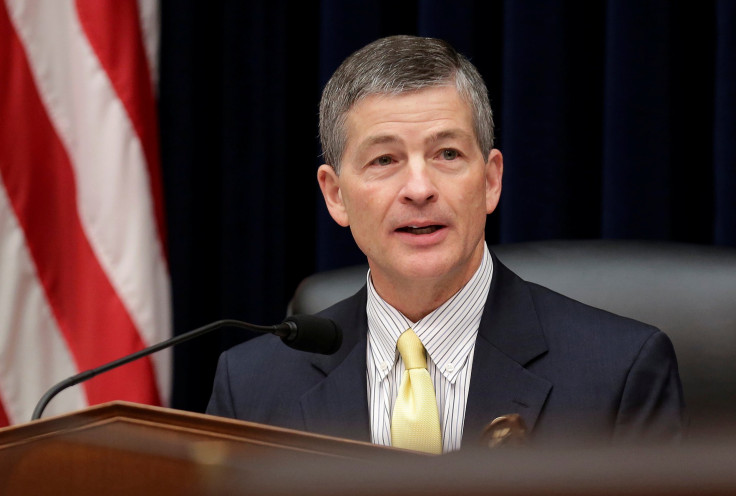Are Republicans Trying To Eliminate Activist Investors? Bill To Replace Dodd-Frank Could Silence Shareholders

Appalled by a Bloomberg Markets Magazine cover story that linked American steel company Nucor Corp. to pig iron suppliers in Brazil who used slave labor, an investment firm with a stake in Nucor called for corrective action. Their mechanism: a shareholder resolution. The proposal appeared on Nucor’s 2009 proxy statement prior to a yearly shareholder meeting — and 27 percent of the company’s shareholders voted in favor of it.
Nucor stalled at first, but within a year, the steelmaker told the stakeholding company, Domini Social Investments LLC (now Domini Impact Investments) that it had begun requiring its manufacturers to sign an agreement with a group of nongovernmental organizations, including a pledge to break ties altogether with the suppliers using forced labor.
The shareholder resolution wouldn't have been legally binding but its success in drawing attention helped achieve real change.
“It’s kind of a little bit of a shame factor,” Adam Kanzer, then Domini's general counsel, now its managing director, said in a phone interview. “The CEO doesn’t want that.”
The tool behind Domini’s ability to pressure Nucor will soon be out of reach to all but a hardly-existent portion of investors if a new bill becomes law. The CHOICE Act, sponsored by Texas Rep. Jeb Hensarling, who chairs the House Financial Services Committee, would replace Dodd-Frank — and sharply raise the ownership threshold for shareholders who can file proposals.

Under current Securities and Exchange Commission rules, investors must own 1 percent or $2,000 worth of a publicly-traded company’s market capitalization for a continuous year. Hensarling’s bill would get rid of the $2,000 standard altogether, mandating that shareholders own 1 percent of the company for three years, according to a committee memo describing the bill. It would also raise the vote percentage needed for investors to resubmit their proposals the following year, and prohibit the filing of proposals on behalf of other investors.
That 1 percent may seem miniscule, but Nucor’s current market cap, for example, is around $19 billion. In order to file a proposal under Hensarling’s CHOICE Act, an investor would have to hold $190 million in shares of the firm. The committee approved the bill in September and planned to hold a hearing on it Wednesday morning.
Executives ‘Need To See A Financial Benefit To Change’
Shareholder proposals have pushed companies to do far more than address human rights abuses within their supply chains. Their effective elimination would have far-reaching consequences for climate change, board diversity and pay equity, pension funds’ power over their investments and companies’ disclosures of lobbying and campaign finance activities.
Some firms — like the asset manager BlackRock, which issued guidance this year on its adherence to environmentally-conscious policies — have taken the lead on climate change issues on their own. But shareholders of other companies, especially those in the energy sector, have been increasingly nudging those firms in the direction of better sustainability, and have drawn substantial shareholder voting support.
In the spring of 2016, nine resolutions from shareholders of energy companies related to the Paris Climate Agreement’s goal (limiting a rise in global temperatures to 2 degree Celsius) garnered an average vote of nearly 38 percent, the for-profit research and consulting firm Governance and Accountability Institute found. Among the nine firms were Southern Co., ExxonMobil Corp. and Chevron Corp., some of the top greenhouse gas polluters.
Last year saw 978 shareholder proposal submissions, Deloitte found; of those, 71 focused on environmental issues, up from 40 in both 2012 and 2013, according to Heidi Welsh, executive director of the nonprofit Sustainable Investments Institute. This year, 66 such proposals were filed. (Shareholder resolutions for the year are generally filed by March.)
With President Donald Trump’s budget proposal draining nearly a third of the Environmental Protection Agency’s budget, a primary force in the fight against climate change could soon be weakened. With the loss of shareholder proposals, another climate regulation tool would be all but eliminated.

To Tim Smith, the director of Environmental, Social and Governance Shareowner Engagement at the Boston-based Walden Asset Management, it would mean his firm would no longer be able to push forward a vote on whether corporate boards ought to publish sustainability reports, as it successfully did with the energy companies Emerson Electric and C. R. Bard Inc.
“We believe — and it’s not just us, but investors we work with — that this is more important than ever before,” Smith said. While many firms were “on a roll with sustainability,” some, like ExxonMobil Corp. and Chevron Corp., were “good on certain things,” he said. “But in terms of moving toward a less-than-two-degree world, they have been behind on that.”
Shareholders also often use proposals to push for pay equity and increased representation of women and minorities on corporate boards. Shareholder resolutions have led some companies to no longer allow a single person to play the role of both chairman and CEO. And, as Natasha Lamb, managing director of Boston-based Arjuna Capital, told American Banker in March, it could be a tool in the fight for corporate wage equality.
“We don’t expect that businesses will change for the sake of doing the right thing — they need to see a financial benefit to change,” she said. “When we file shareholder proposals, that’s the position we’re coming from.”
Shareholder resolutions can also be a means of shedding light on corporations’ lobbying and campaign finance activities at a time when, a February study found, only 12 percent of publicly-traded firms in the Standard & Poor’s 500 Index disclosed their lobbying expenditures. The number of shareholder proposals on lobbying, the report noted, grew to 64 in 2016 from just five in 2010. Proposals related to elections remained relatively flat, but still made up a large portion of resolutions involving political activity, with between 40 and 63 filed per year between 2010 and 2016.
A group of shareholders of the health insurance giant Anthem Inc. might be especially angered at the impending loss of a major corporate transparency tool. Earlier this year, Anthem shareholders submitted a resolution asking the company to disclose its “policy and procedures governing lobbying” and “payments by Anthem used for direct or indirect lobbying or grassroots lobbying communications.” But the SEC effectively blocked the resolution, giving Anthem executives free rein to keep lobbying information out of their proxy statement.
Meanwhile, Anthem lawyers expressed hope that Trump’s administration might settle an antitrust suit by the Justice Department blocking the health insurance giant’s $48 billion acquisition of Cigna — a merger that would create the nation’s largest health insurance conglomerate.
Last year, Anthem poured millions into campaign groups with ties to officials presiding over the agencies that would oversee and evaluate the merger, channeled $100,000 toward Trump’s inaugural committee and saw one of its key lobbyists take a top legal post at the White House.
‘All Hell Has Frozen Over’
Shareholder proposals are also useful to pension funds, which hold relatively large assets but still would fail to meet the 1 percent threshold.
“Apparently all hell has frozen over, as the Republicans are now attacking investors,” said Brandon Rees, deputy director of the Office of Investment for the American Federation of Labor and Congress of Industrial Organizations, the largest federation of unions in the U.S. He added that even though the AFL-CIO’s fund holds about $7 billion in total assets, Hensarling’s proposal “would completely disenfranchise working people’s voices.”
Public pension fund managers expressed similar frustration.
“As a major long-term investor, the New York State Common Retirement Fund regularly files shareholder resolutions that call for action at the companies in its portfolio in order to protect the value of our investments,” New York State Comptroller Thomas DiNapoli’s office said in a statement, calling the proposed rule change “outrageous.” The office of his New York City counterpart said in a similar statement that the adjustment “would silence investors like our office — and hurt our City’s retired firefighters, police officers, and teachers.”
So why would Hensarling want to essentially get rid of the shareholder proposal? A press representative from the Texas Republican’s office referred IBT to the House Financial Services Committee. In a statement, a Republican committee staffer, through a spokesperson, attributed the proposed change to “gadflies” who “hijack the process to push social and politically motivated agendas.”
But it may help to look at a February letter from the Business Roundtable, an association of chief executives chaired until recently by the CEO of one of Hensarling’s top campaign contributors, JPMorgan Chase & Co.’s Jamie Dimon. Addressed to Trump’s National Economic Council Director Gary Cohn, it asks for several Dodd-Frank and SEC rule rollbacks, among them the $2,000 threshold for shareholder proposals.

“In too many cases, activist investors with insignificant stakes in public companies make shareholder proposals that pursue social or political agendas unrelated to the interests of the shareholders as a whole,” the missive states. It cited Business Roundtable’s far more detailed and restrictive proposed limits on the shareholder proposal process, as enumerated in a post that characterizes the current rule as “outdated.”
Nanette Heide, a partner at the law firm Duane Morris and a board member of the New York chapter of the Association for Corporate Growth, a global organization for merger and acquisition professionals, thinks policymakers ought to find a “happy medium.”
“We want to be an attractive public trading market for both U.S. investors and non-U.S. investors as well,” she said, echoing the worry that some shareholders are “pushing their own agenda for no one but themselves.” Heide suggested post-recession laws might’ve been “too reactionary,” and could be reined in.
While the three-year ownership period and 1 percent threshold struck her as far too rigorous, she pointed to data citing a relative dearth of calls for diversity and equal pay among the proposals. And although many described resolutions as a low-cost, efficient way to call attention to risks and other problems within a corporation, she cited concerns about the costs to the company itself.
“The cost of bringing a proposal is greater than $2,000,” Heide said. “Maybe there's a more moderate place in between [$2,000 and 1 percent] so that people aren’t making a small investment in the company and using it to their benefit.”
To Kanzer, who was behind the push to break Nucor’s ties to slave labor, an investor’s financial stake is a non-factor.
“It may not matter that the person who raised the idea owned $2,000 worth of stock or half a billion worth of stock,” he said, adding that owners of as much as 1 percent of a company can often simply pick up the phone and call its executives. “It’s the idea that matters.”
© Copyright IBTimes 2024. All rights reserved.






















